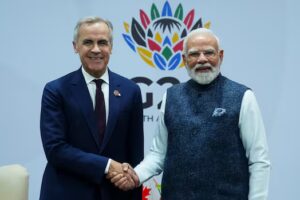
Canadian health experts equipped with binders of information on the prolonged measles outbreak will travel in November to Mexico City, where an international committee will determine whether the country maintains its elimination status for the disease.
The meeting with the Measles and Rubella Elimination Regional Monitoring and Re-Verification Commission (RVC), which works with the World Health Organization, may be more of a formality than a test for Canada, as it is all but assured to lose its designation.
The country has been free of endemic measles for 27 years but is now facing an outbreak that has killed at least two people and infected more than 5,000 others since last October. Canada’s chain of homegrown transmission would have to be broken by Oct. 27, one year to the date since the country recorded its first locally acquired case of measles, in New Brunswick, to retain its elimination designation.
Natasha Crowcroft, vice-president of infectious diseases and vaccination programs at the Public Health Agency of Canada, said in an interview last month that it would take “a miracle” for Canada to cling to its status. There’s now less than three weeks remaining. “We still have cases being reported and, even if they’re on the down swing, it would be astonishing if we didn’t still have transmission by the end of October,” said Dr. Crowcroft.
Although the elimination designation itself is symbolic, losing it would be a wake-up call for Canada.
The outbreak has already put pressure on emergency departments across the country, where posted signs on windows warn of the circulating virus. Infected patients have been ushered in through back doors by health care workers wearing full-body protective gear. Inside, there are isolation rooms and protocols to ensure the lingering virus doesn’t infect other patients waiting for care.
Open this photo in gallery:
A nurse in London, Ont., shows visitors how to mask up at a hospital’s measles screening point. Southwestern Ontario lost a child to the disease this past summer.GEOFF ROBINS/AFP via Getty Images
Hospitals in hard-hit areas, which were already under intense strain, have been pushed to their limits – and so, too, have health resources tasked with tracking measles outbreaks and bringing them under control.
In 1998, Canada was one of the first countries in the world to eliminate measles, a feat only possible because of a highly co-ordinated public health response and mass immunization campaigns. Losing its elimination status will be a blow to its global health standing and raises a pressing question: How is a country that invested so heavily in public health unable to protect its citizens from a forgotten disease?
One of the main causes is shrinking vaccination rates, which have allowed measles to spread more easily. If measles can make a comeback, infectious disease specialists warn Canada is fertile ground for other deadly childhood diseases, such as mumps, diphtheria and polio.
Immunologist Dawn Bowdish, a professor of medicine at McMaster University, said it would be a “national embarrassment” for a developed nation like Canada to lose its status, especially when the measles, mumps and rubella, or MMR, vaccine is widely available. “We’ve been too lenient, too complacent, and, as a result, we don’t have systems in place to stop this from happening,” she said.
A recent investigation by The Globe and Mail traced the embers of Canada’s viral blaze to southern Thailand. It found that measles took an 18,000-kilometre ride with an unknowing host from the Thai town of Narathiwat to Florenceville, N.B.
In that Maritime town, on Oct. 18, 2024, Lea Knelsen attended her sister’s wedding, where she spread the virus to unvaccinated guests, many of whom then travelled back home to Ontario. This ignited the multijurisdictional outbreak that now threatens Canada’s elimination status.
Cases have since surfaced in every province but Newfoundland and Labrador. The hardest-hit are Ontario and Alberta, which have combined to make up 86 per cent of the country’s cases since last October.
Spread in the country has lessened over the last few months but new infections continue to pop up. The territories remain unscathed.
The domestic and international revival of measles has been attributed largely to lower childhood vaccination rates. At the epicentre of Canada’s outbreak is the Mennonite community, where opposition and hesitancy to vaccines has allowed the highly contagious virus to spread freely, especially in the rural areas of Ontario and Alberta.
Before Canada’s current outbreak, there have only been minor resurgences since elimination in 1998. Public Health Agency of Canada data show there were 752 cases in 2011, 418 in 2014 and roughly 200 in both 2000 and 2015. Most other years, there were less than 100 cases.
Red spots that merge to form large, blotchy patches are usually the first identifiable signs of a measles infection. Other symptoms include a fever, dry cough and watery eyes. But those with a severe case can also suffer complications, such as blindness, brain swelling, pneumonia and even death.
Measles is one of the world’s most contagious diseases, up to six times more transmissible than COVID-19 and 12 times more than influenza. It can spread through respiratory particles and linger in the air for up to two hours, attacking people even when a host is no longer present.
Its extreme contagiousness made measles a tough disease to bring under control. In the WHO’s Americas region, it was a 22-year effort that involved a co-ordinated mass vaccination to eliminate the disease in 2016, making it the first – and only – region in the world to do so.
WHO member states are divided into six regions. The Americas includes all 35 countries in North, Central and South America, plus the Caribbean. The region lost its status after only two years when Venezuela, in 2018, and Brazil the following year, suffered outbreaks. Both countries were able to interrupt transmission and, in 2024, the regional status was recovered.
Alvaro Whittembury, an immunization expert for the Pan American Health Organization (PAHO) – a regional arm of the WHO – said multiple countries in the Americas are now facing outbreaks of the same genotype circulating in Canada, including the United States, Mexico, Bolivia, Brazil and Paraguay. All of these countries are seeing outbreaks in their respective Mennonite communities.
Dr. Whittembury said there was also a single case in Argentina but, because the Mennonite community there is largely supportive of vaccines, it was contained. He urged countries to improve efforts to “sustain high vaccination coverages,” which he called “the most important intervention in public health to avoid diseases.” Measles is the type of disease, he said, that can reveal even the smallest weakness in a country’s health care system due to its pervasive nature.
In July, members of PAHO and the affiliated regional verification commission visited Canada to meet with officials from Ottawa, Ontario and Alberta.
At that time, there was still a three-month window for Canada to stifle spread. The meeting was a last-ditch effort to see whether Canada could save its status.
Dr. Crowcroft, who previously worked for the WHO as a senior technical adviser on measles and rubella, said the group carefully reviewed Canada’s outbreak and efforts to shut it down.
The commission provided a list of recommendations, acknowledging that Canada was following best practices but needed to expand them. The use of provincial vaccine registries and development of a national registry was advised; so, too, was expanding practices for vaccination in migrant and vaccine-hesitant communities.
Surveillance could also be improved, noted the commission, by proactively searching for new cases in high-risk communities that may not be reporting suspected cases.
Open this photo in gallery:
Dr. Crowcroft was once an adviser to the World Health Organization. She recalls how its officials looked at Canada’s measles plan and the narrowing window of time to improve it.Ashley Fraser/The Globe and Mail
Despite Canada enhancing its efforts, the one-year window is now nearly closed and cases continue to mount. Dr. Whittembury said this indicates that Canada must do more to promote vaccination.
About 95 per cent of the population must be fully immunized against measles to achieve herd immunity. Data from the WHO show only 79 per cent of Canadians had two doses of the MMR vaccine in 2024. However, coverage at a community level varies greatly, in some areas dipping below 50 per cent.
The threshold to achieve herd immunity for other vaccine-preventable diseases, which are less contagious than measles, is lower. For example, a rate of about 80 per cent can prevent the spread of polio.
Janna Shapiro, a post-doctoral fellow at the University of Toronto’s Centre for Vaccine Preventable Diseases, said the return of measles is alarming, because it suggests other forgotten diseases could make a comeback, too.
“That’s not to say that anyone’s going to get polio tomorrow, but just to say it means that we have a real problem with routine vaccination uptake in Canada,” she said.
Public health experts say the conditions for Canada’s current outbreak has been years in the making. Complacency after decades of relatively few measles cases is a key driver of its resurgence.
So, too, is the rise of vaccine misinformation and disinformation – including the debunked 1998 study that connected measles to autism – as well as disruptions to vaccine schedules because of the COVID-19 pandemic, a widespread shortage of family doctors and underfunding of public health.
McMaster’s Prof. Bowdish adds that the “ever-growing pockets of people who are unvaccinated” owing to school exemptions for routine vaccinations on philosophical or religious grounds are another factor creating the “perfect storm.”
Canada, if it loses its status, can earn back its designation if it records one continuous year without sustained measles transmission.
To achieve this, experts say Canada will need to strengthen existing practices, such as public health outreach to vaccine hesitant communities, and implement new tools, such as creating a national vaccine registry, which Ontario’s Chief Medical Officer Dr. Kieran Moore has called for.
Prof. Bowdish added that exemption policies need to be scrutinized, and should be restricted to only those with deeply held religious beliefs. Additionally, she said people and companies should be held responsible for vaccine disinformation.
“This is a critical moment,” she said. “The time is now to make changes.”
Open this photo in gallery:
Nick Iwanyshyn/The Globe and Mail
Measles returns: More from The Globe and Mail
The Decibel podcast
To find out how measles reignited in North America, reporter Nathan VanderKlippe went on a 40,000-kilometre medical odyssey from southern Thailand to small-town New Brunswick. He spoke with The Decibel about his surprising findings, and what they tell us about other potential outbreaks in the future. Subscribe for more episodes.
It’s a scientific marvel, so why does the measles vaccine face apathy and anxiety?
Ask a doctor: What vaccines should I get as an adult?
I’m fully vaccinated against measles, but I still became Ottawa’s fifth confirmed case this year





